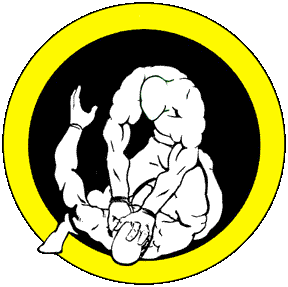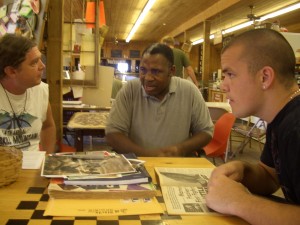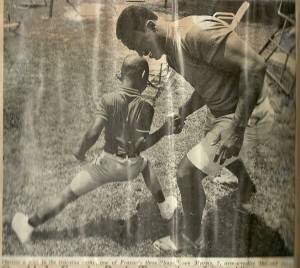BREAKFAST WITH Marvis Frazier
Posted on | July 16, 2010 | 2 Comments

By: Patrick and Darren McElligott
Early in the morning of July 7, a relative let Darren and I know that Marvis Frazier was scheduled to be in Otego, N.Y., over the weekend. Within hours, we had made arrangements with his friend, Jamie Potter, a Fight News Unlimited reader, to do an interview with Marvis on Sunday, at Jamie’s “Pie in the Sky” country store/ diner. During the afternoon, we considered what questions our readers want to ask the former amateur star, heavyweight contender, and son of the legendary heavyweight champion.
Our preparation included going back through Darren’s collection of boxing magazines, and locating the January, 1981 edition of World Boxing’s article on Marvis’s pro debut, by Steve Farhood; getting out “Lazarus and the Hurricane,” by Chaiton and Swinton (1991); and finding a rare 1967 of Joe and Marvis in one of our boxing scrapbooks from that year.
Darren also did some research on the internet. Like many boxing fans in their twenties, he had been impressed by Marvis’s insights on last year’s HBO documentary, “Thrilla in Manila.” And he knew that Marvis had fought for the heavyweight title. But the deeper he went, the more intent he became on our focusing our interview on those topics that have been overlooked by others, rather than settling for the obvious questions.
By late afternoon, I had brought our my “Frazier vs Ali 2” poster, from that January, 1974 night that my brother Mark and I had sat ringside in Madison Square Garden. We called Mark, who had followed Joe Frazier’s career closely since the 1964 Olympics. From his west coast home, Mark told us to give Marvis a message from a true boxing fan: that Smokin’ Joe ranks with the greatest heavyweight champions of all time; and more, that for a generation of young sports fans across America, Joe served as a great role model.
On Sunday morning, sitting at a table at the “Pie in the Sky,” I delivered Mark’s message to Marvis. He said that he would pass it on to his father. And then, in that context, came our first question.
FNU: What did Joe Frazier teach you and your siblings about family values?
Marvis: My Dad had a saying that there’s no right way to do wrong, and no wrong way to do right.
FNU: Oh, that’s good!
Marvis: (laughing) It set the expectations.
Q2: Steve Farhood called you “Little Smoke” in his article on your pro debut. This was both a compliment, and a bar set very high. How were you able to make sense of, and deal with, the extraordinary pressure that came from the high expectations that came with being Joe Frazier’s son?
Marvis: No – my brother was “Little Smoke.” That was Joe Jr., or Hector.
Me? I loved it. I loved standing in that light. It was great to fight in Madison Square Garden, where my father had made history. Dad used to say to me, “Son, you can only be you. You can’t be Daddy.” So that was how I dealt with being Marvis. I had my father in my corner. And I had trust in the Good Lord.
FNU: Your amateur career raised all expectations even higher. Few amateurs go 56-2, when they compete at the highest levels against the top fighters in the country. Not only were you ranked at the top in the nation, after winning tough tournaments, but you were fighting guys a lot bigger than you.
For example, Tim Witherspoon was 6′ 3 1/2” tall; Bonecrusher Smith was 6′ 4”; and Mitch “Blood” Green was 6′ 5”. They were not only huge, but very talented fighters. How the heck did you beat them?
Marvis: Both Smith and Witherspoon won championships as professionals …
FNU: And Green, who won the New York City Golden Gloves four times, was viewed as a likely future professional champion by many.
Marvis: Yeah, and I beat him twice. I beat the big guys the same way as my father did. (laughs) Short guy – no excuses – just get in there and get the job done. I actually dropped Tim Witherspoon.
FNU: You could have represented the US in the 1980 Olympics. We would have had an outstanding team, one that I believe would have ranked with the 1976 and ’84 teams. What were your thoughts on the US boycotting the 1980 Olympics?
Marvis: I got beat in the Olympic trials. I had lost to James Broad, and I wouldn’t have made it.
FNU: That guy who won the Olympics in ’64 had lost in the trials, too.
Marvis: Well, I didn’t think it was fair to the fighters, but it was the President’s decision, and you stand behind the President. The U.S. would have had a really strong team that year, though. And it wasn’t just the boxers – a lot of athletes were disappointed, because they had trained all those years in preparation for their shot at a gold medal. But, if the Chief says no, you do what the Chief says.
FNU: The reason that there are weight classes in sports like boxing and high school/ college wrestling is because size matters. It takes an exceptional athlete to compete against the very best athletes who have a distinct size advantage. Do you think that in professional boxing, it would make sense to have a super heavyweight division?
Marvis: There is the cruiserweight division for guys under 200 pounds. But if you are 201 pounds, you have to compete against guys who might weigh 250 pounds. There were guys that big in the past – there’s just more of them today. But they don’t have the speed and mobility that a 210 pound fighter has. You have to take advantage of that.
FNU: Your pro debut came a couple days after your 20th birthday. Roger Troupe, a former football player, was able to give you a tough fight for the first two rounds – including his landing about four hard punches after the bell ending the first round. What do you remember the most about that fight?
Marvis: Troupe stung me at the end of the first round. I remember that when he hit me with a straight right hand, I almost went down. It was that neck injury. And I remember thinking, “Brother, what’s going on here?” (laughs)
FNU: In April of 1983, you made a big statement in handing James Broad his first professional defeat. It was revenge for the amateur bout. When you were training for that fight, did you and Joe ever talk about his experience with Buster Mathis? Also, do you remember how you felt in the days after that fight?
Marvis: Yes. My father was saying, “Just get your name back, Son.” And as a matter of fact, Broad kept throwing that same right hand, expecting the same result. But I kept thinking, “No, no – I got that neck taken care of!” (laughs)
FNU: Both Mathis and Broad had their pro careers derailed by these first loses. One result is that neither get the credit they deserve for having been outstanding talents in the ring. What do you think is the difference in the psychological make-up of boxers that allows some to come back stronger after a loss, versus those who are destroyed by their first loss?
Marvis: That’s true. But, you know, I can only speak for myself. I can’t speak for Buster or James. They were both good fighters in a tough sport. If you lose in boxing, you have to have it inside you that you’re a man, and so is he. All you can do is your best. So my thing was to always try my best. I never lost hope. Like the thing with Larry (Holmes) or Mike (Tyson) – larry beat me, and Mike beat me – but I felt like, “Hey, if you think you can do it again, let’s go.” You know? “If you think you’re bad enough, let’s do it again!” (laughs)
FNU: In June of 1983, you beat Joe Bugner. He had previously fought both your father – as well as Ali and warriors including Ernie Shavers, Ron Lyle, Mac Foster, and Jimmy Ellis. What was it like to beat a guy who had that level of experience?
Marvis: Oh, man, I wanted to knock Bugner out! I went into that ring saying to myself, “I’m going to knock this guy out.” At that time, other than his first fight, only Shavers had knocked him out. And I hit him with about a million punches, but he went the whole ten rounds.
FNU: He was a durable guy, with solid defensive skills. What were you thinking in the fourth round, when you dropped your hands and he threw five or six punches, but couldn’t touch you?
Marvis: Oh, that was something that I did with most guys. I wanted to show them that I felt like MC Hammer! (laughs)
FNU: You had the hand and foot speed that allowed you to counter when opponents missed like that.
Marvis: Right.
FNU: Two of your most impressive wins were over Jose Ribalta and James “Quick” Tillis. Both were strong, athletic, and talented boxers. It was difficult for anyone to look good fighting these guys. What was your mind-set going into those fights, that helped you stay focused rather than becoming as frustrated as most guys fighting them did?
Marvis: Well, number one, it’s a matter of conditioning. It’s the strength of faith in yourself, that you can go ten hard rounds with tough guys like these two. And that’s part of being a Frazier! It’s something in the genes, you know. (laughs)
Q11:. On October 1, 1975, your father and Ali fought one of the greatest heavyweight title fights. The Thrilla in Manila is definitely one of the most memorable contests in all of sports’ history. On October 17, they met again – to lead a demonstration in Trenton, NJ, in support of Rubin “Hurricane” Carter.
In the book “Lazarus and the Hurricane,” the story of Joe’s friendship with Rubin is told. Carter was helping Art Tucker prepare to compete in the ring. He called Joe, to ask if he could bring some fighters to Rahway State Prison to spar the 6′ 6” Tucker. Joe brought Bert Cooper and you. What do you remember about that experience?
Marvis: Well, I know that Bert Cooper was a great fighter. But I don’t remember going there. It may have been my brother and Bert. I do remember Art Tucker, though. Big guy, good fighter.
FNU: His first two fights were held at Rahway. That was back around the time that James Scott boxed in Rahway State Prison, too.
We’re correcting the record on a few things today. I had been going to ask if that experience influence your decision to become involved in the Prison Fellowship program when you became a minister?
Marvis: No, no. That is different. I walk with Christ, the Lord. I’ve been a Christian since I was 16, and that is something that my faith motivates me to do. For about 13 or 14 years, I’ve gone around the country, talking to boys and girls about the love of Christ, how He can change your life and make you whole. As a preacher, I say put your faith in Him. You know, God won’t put a .357 magnum against your head, saying, “Go ahead, make my day.” Instead, it’s that quiet knock on your door. It’s your decision to let God into your life.
FNU: If you, today, were able to advise the young prospect Marvis Frazier of the 1980s, would you suggest that he consider competing in the cruiserweight division?
Marvis: No! Oh, no! Stay heavyweight! Because every last guy I beat was a heavyweight. From my days as an amateur at 56 and 2, and as a professional at 19 and 2, I was beating heavyweights. I don’t think that’s any reason to fight at cruiserweight.
FNU: What message would you give to young fighters today?
Marvis: I think that boxing is a great sport. It’s a sport where if you dedicate yourself, train hard, and work hard at learning the things that your coach is teaching you, you’ll make it.
FNU: So, it’s important to get out of bed early, like your trainer says, and do roadwork?
Marvis: Oh, especially to get out of bed early, and do that roadwork! You won’t have the energy to do the things that you know you should be doing in a fight, if you haven’t put in those miles of roadwork. And one more thing: If you don’t have Christ, please get Him in your life!”
Tags: Auto > Boxing > boxing magazines > division > draft > father > fight > Good > hand > heavyweight contender > jamie potter > Joe Frazier > lazarus and the hurricane > loss > Madison Square Garden > Marvis Frazier > neck > PATRICK MCELLIGOTT > pro debut > result > round > Smith > smokin joe > thrilla in manila





